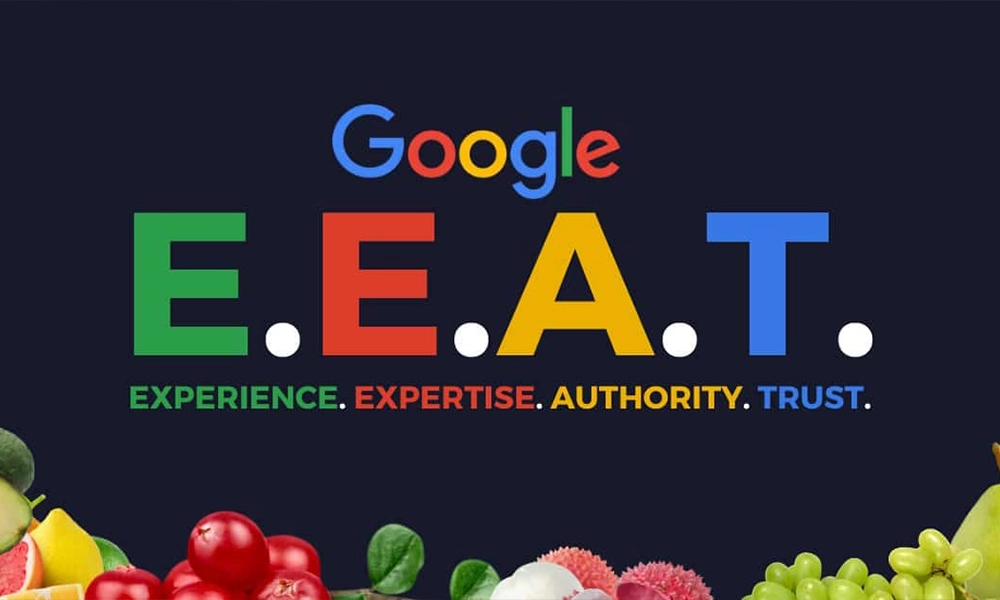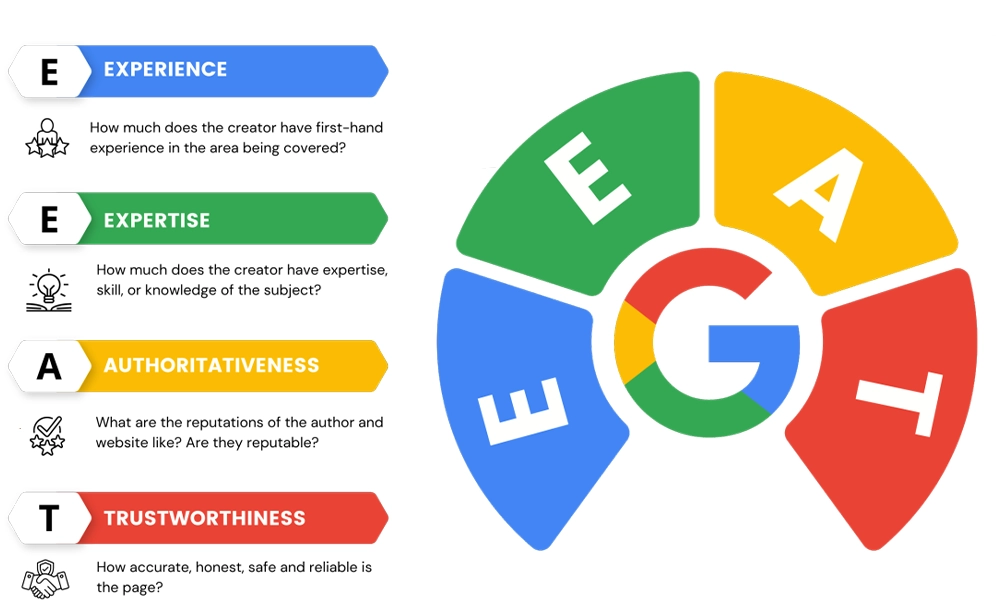What Is EEAT?
EEAT is a concept introduced by Google as part of its efforts to evaluate content quality in search results. Google evaluates websites based on four primary pillars: Experience, Expertise, Authoritativeness, and Trustworthiness. These pillars help Google determine how relevant and reliable a website is for users, ensuring that the information provided is not only accurate but also aligns with the searcher’s intent.

In the context of local SEO and Generative Engine Optimization targeting, EEAT becomes even more important. Websites that serve specific geographic areas are expected to demonstrate localized expertise and authority. For example, if your business offers SEO services in a specific city or region, Google will assess how well your website reflects local experience and trustworthiness. This is crucial for businesses aiming to rank higher in local search results, as Google places emphasis on providing users with the most relevant, geographically-accurate content.
- Experience: This refers to the firsthand experience the content creator has with the subject matter. Websites that demonstrate personal experience in a specific field or subject tend to perform better. For example, a blog post about personal finance written by someone with actual experience in managing finances is more likely to rank higher than one written by someone with little expertise in the area.
- Expertise: Expertise refers to the depth of knowledge the content creator has on a particular topic. Websites that show a high level of expertise—either through qualifications, certifications, or demonstrated industry knowledge—are favored by Google. For instance, medical or legal websites are expected to have highly qualified experts providing information.
- Authoritativeness: This measures how authoritative and influential your website or brand is in its niche. Being an authority in your field means your content is respected by other trusted sources. High-quality backlinks, mentions from reputable sites, and an established online presence contribute to demonstrating authority.
- Trustworthiness: Trust is essential in any content, and Google uses trust signals to determine the reliability of your website. Factors such as a secure website (HTTPS), transparent business practices, clear authorship, and the accuracy of your content are important signals that contribute to trustworthiness.
Together, these four components form the foundation of how Google ranks your website. EEAT is essentially Google’s way of measuring the quality of content and ensuring that users receive accurate, reliable, and helpful information.
Why EEAT Is Important
EEAT plays a critical role in determining your website’s search engine ranking and the visibility of your content. Here are some reasons why EEAT is essential for SEO, especially when optimizing for brand mention SEO and improving your Guide to SEO Conversion Rate:
- Improved Rankings: Websites with high EEAT are favored by Google’s algorithm and are more likely to rank higher in search results. This is because Google wants to prioritize content that is most helpful, accurate, and trustworthy for users. For example, if your website has strong brand mention SEO, meaning your brand is mentioned positively across trusted sources, Google sees this as a sign of authority, which helps improve rankings.
- Better User Experience: Websites that adhere to EEAT principles provide users with high-quality, relevant, and valuable content. This leads to higher user engagement, longer time on page, and a lower bounce rate, all of which are favorable ranking signals for Google. When users experience a seamless and trustworthy environment, it also leads to better SEO conversion rates, as visitors are more likely to convert into customers or subscribers.
- Increased Credibility: EEAT helps establish your website as a trusted source of information in your niche. When your website is recognized as an authority in its field, users are more likely to return, share your content, and trust your products or services. Positive brand mention SEO, including credible reviews and mentions across high-authority websites, further enhances this trust and credibility, positively influencing your brand’s SEO performance.
- Compliance with Google’s Guidelines: Google’s quality raters use EEAT as part of their guidelines to evaluate the overall quality of content. Websites that adhere to EEAT principles are more likely to meet Google’s standards for quality content, making them more likely to rank well. For businesses, this means that focusing on brand mention SEO and creating valuable content in line with these guidelines is key to long-term success.
- Protection Against Algorithm Penalties: Google’s algorithms are designed to penalize websites that provide low-quality content. Websites that do not demonstrate experience, expertise, authority, and trustworthiness may suffer penalties, leading to lower rankings. To avoid penalties, it’s essential to focus on building trust through EEAT and enhancing SEO conversion rates by ensuring your content resonates with users and meets their needs.

Incorporating brand mention SEO and focusing on improving your Guide to SEO Conversion Rate alongside EEAT will help you create a website that ranks higher and engages users effectively. By building your reputation and demonstrating expertise and trustworthiness, your website will thrive in an ever-competitive digital landscape.
How to Demonstrate EEAT for Your Brand
Demonstrating EEAT for your brand requires a strategic approach to content creation, website optimization, and user engagement. Here are several steps you can take to ensure your website meets the EEAT criteria:
- Create High-Quality Content: Content should be original, well-researched, and offer value to users. Avoid fluff or overly promotional content. Instead, focus on creating in-depth articles that answer user queries comprehensively.
- Showcase Expertise: Clearly demonstrate your qualifications, certifications, and experience in the field. For example, if you’re writing about medical topics, make sure that the author has appropriate credentials or experience in the medical field. If your brand offers services in a specific niche, such as finance or law, highlight the qualifications of your team members.
- Publish Authoritative Content: To establish authority, aim to become a trusted voice in your industry. This can be achieved by publishing content that is referenced by other authoritative sites, obtaining high-quality backlinks, and contributing guest posts or collaborations with other experts in the field.
- Improve Trust Signals: Add elements that increase trust, such as:
- HTTPS: Ensure your website is secure with an SSL certificate.
- About Us Page: Include detailed information about your brand, team, and mission to build trust.
- Transparent Contact Information: Provide easy-to-find contact details and customer service information.
- Social Proof: Show customer testimonials, reviews, and case studies that validate your authority and trustworthiness.
- Create Authoritative Author Bios: For content creators, ensure you have author bios that detail your expertise and credentials. For example, a finance blog post should include the author’s background in financial planning or investment.
- Content Accuracy and Updates: Regularly update your content to ensure that the information is current and relevant. Fact-checking and providing citations for claims made in your content are essential for demonstrating trustworthiness.
How Google’s Quality Raters Evaluate EEAT
Google’s quality raters use a set of guidelines to assess the overall quality of a website. These guidelines, which are publicly available, provide insight into how Google evaluates content for EEAT. Some of the criteria quality raters look for include:
- Reputation: Google evaluates whether your website has a good reputation, especially in regard to its expertise and trustworthiness. This can be gauged by user reviews, mentions in trusted publications, or expert endorsements.
- Author Information: Quality raters check for clear information about the authors of content. They look for author bios that show the qualifications and experience related to the content.
- Trustworthiness of the Website: Raters examine the overall trustworthiness of the website, such as the security of the site, accuracy of the information, and whether it follows ethical standards (e.g., disclosure of affiliate links).
- Content Depth and Quality: The quality of content is evaluated based on how comprehensive and well-researched it is. Content that provides useful, detailed information that answers user questions is rated higher.
- Purpose of the Website: Websites that provide helpful, informational content (rather than content designed solely to drive sales) are ranked higher in terms of EEAT. A site selling products must still provide valuable information, such as product reviews or buyer guides.
EEAT and AI-Generated Content
As AI-generated content becomes more common, it raises the question of how it fits into the EEAT framework. While AI can produce content quickly and efficiently, there are concerns about the quality and trustworthiness of AI-generated material. Google has stated that AI-generated content should still meet the same EEAT standards as human-generated content. This means that:
- AI content should provide value and demonstrate expertise.
- AI tools should be used as an aid rather than a replacement for expert knowledge, especially in YMYL (Your Money or Your Life) topics such as health, finance, and legal advice.
- AI-generated content must be accurate and fact-checked to ensure that it meets Google’s trustworthiness requirements.
Using AI to create content can be beneficial if it’s used responsibly and in conjunction with human expertise to ensure it meets the EEAT standards.
EEAT Is A Sustainable, Long-Term Approach to SEO
Focusing on EEAT provides a sustainable, long-term SEO strategy. Unlike quick SEO tricks or keyword stuffing, EEAT ensures that your website delivers high-quality, valuable content that is aligned with user intent. As Google continues to refine its algorithms to prioritize the best, most relevant content, adhering to EEAT principles will help your website stay competitive.
By focusing on creating valuable content, showcasing expertise, establishing authority, and building trust, your website can consistently rank well over time. Additionally, EEAT helps you build a strong reputation with your audience, which leads to long-term user engagement and brand loyalty.
E-E-A-T is a critical factor in today’s SEO landscape. By understanding what E-E-A-T means and how it impacts your website’s ranking, you can create a more authoritative and trustworthy online presence. The more you demonstrate expertise, authority, and trustworthiness, the better your content will rank in search engines, leading to greater visibility and engagement with your audience. Focus on delivering high-quality content that aligns with these principles, and you’ll see long-term success in your SEO efforts. Working with experts, such as Quanta agency, can also help ensure your E-E-A-T strategy is optimized for maximum results.










